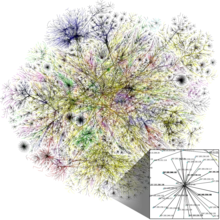Intergalactic Computer Network
Intergalactic Computer Network or Galactic Network[1] (IGCN) was a computer networking concept similar to today's Internet.
| Internet |
|---|
 |
|
|
J.C.R. Licklider, the first director of the Information Processing Techniques Office (IPTO) at The Pentagon's ARPA, used the term in the early 1960s to refer to a networking system he "imagined as an electronic commons open to all, ‘the main and essential medium of informational interaction for governments, institutions, corporations, and individuals.'"[2][3] An office memorandum he sent to his colleagues in 1963 was addressed to "Members and Affiliates of the Intergalactic Computer Network".[4] As head of IPTO from 1962 to 1964, "Licklider initiated three of the most important developments in information technology: the creation of computer science departments at several major universities, time-sharing, and networking."[3]
Licklider first learned about time-sharing from Christopher Strachey at the inaugural UNESCO Information Processing Conference in Paris in 1959.[5]
By the late 1960s, his promotion of the concept had inspired a primitive version of his vision called ARPANET. ARPANET expanded into a network of networks in the 1970s that became the Internet.[2]
See also
References
- Leiner, Barry M.; et al. (2003-12-10). ""Origins of the Internet" in A Brief History of the Internet version 3.32". The Internet Society. Retrieved 2007-11-03.
- Garreau, Joel (2006). Radical Evolution: The Promise and Peril of Enhancing Our Minds, Our Bodies--and what it Means to be Human. Broadway. p. 22. ISBN 978-0-7679-1503-8.
- "Defense Advanced Research Projects Agency (DARPA) (United States Government)". Encyclopædia Britannica. Encyclopædia Britannica, Inc. Retrieved 11 January 2014.
- Licklider, J. C. R. (23 April 1963). "Topics for Discussion at the Forthcoming Meeting, Memorandum For: Members and Affiliates of the Intergalactic Computer Network". Washington, D.C.: Advanced Research Projects Agency, via KurzweilAI.net. Retrieved 2013-01-26.
- Gillies, James M.; Gillies, James; Gillies, James and Cailliau Robert; Cailliau, R. (2000). How the Web was Born: The Story of the World Wide Web. Oxford University Press. pp. 13. ISBN 978-0-19-286207-5.
Further reading
- Jones, Steve (2003). Encyclopedia of New Media. Sage Publications, via Internet Archive limited preview. p. 287. ISBN 0-7619-2382-9. Retrieved 2007-11-03.
- Page, Dan and Cynthia Lee (1999). "Looking Back at Start of a Revolution". UCLA Today. The Regents of the University of California (UC Regents). Archived from the original on 2007-12-24. Retrieved 2007-11-03.
- Hauben, Ronda (19 March 2001). "Draft for Comment 1.001, "The Information Processing Techniques Office and the Birth of the Internet"" (Microsoft Word). Retrieved 2007-11-03.